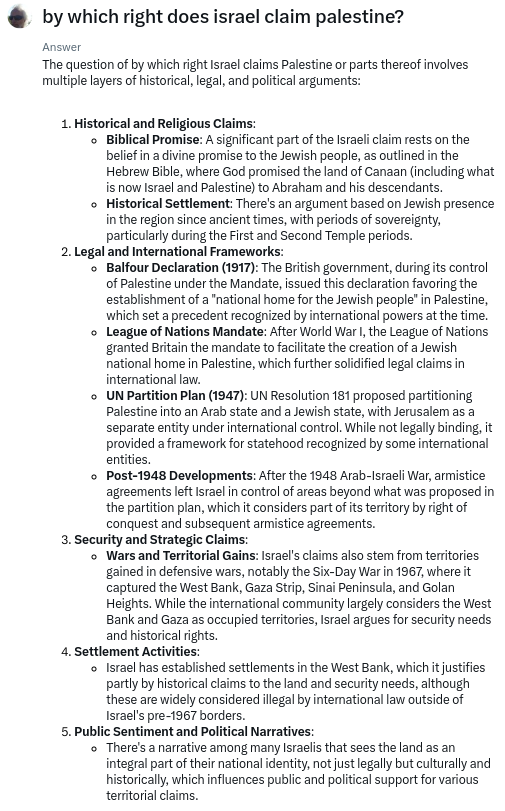The question of by which right Israel claims Palestine or parts thereof involves multiple layers of historical, legal, and political arguments:
Historical and Religious Claims: Biblical Promise: A significant part of the Israeli claim rests on the belief in a divine promise to the Jewish people, as outlined in the Hebrew Bible, where God promised the land of Canaan (including what is now Israel and Palestine) to Abraham and his descendants. Historical Settlement: There's an argument based on Jewish presence in the region since ancient times, with periods of sovereignty, particularly during the First and Second Temple periods. Legal and International Frameworks: Balfour Declaration (1917): The British government, during its control of Palestine under the Mandate, issued this declaration favoring the establishment of a "national home for the Jewish people" in Palestine, which set a precedent recognized by international powers at the time. League of Nations Mandate: After World War I, the League of Nations granted Britain the mandate to facilitate the creation of a Jewish national home in Palestine, which further solidified legal claims in international law. UN Partition Plan (1947): UN Resolution 181 proposed partitioning Palestine into an Arab state and a Jewish state, with Jerusalem as a separate entity under international control. While not legally binding, it provided a framework for statehood recognized by some international entities. Post-1948 Developments: After the 1948 Arab-Israeli War, armistice agreements left Israel in control of areas beyond what was proposed in the partition plan, which it considers part of its territory by right of conquest and subsequent armistice agreements. Security and Strategic Claims: Wars and Territorial Gains: Israel's claims also stem from territories gained in defensive wars, notably the Six-Day War in 1967, where it captured the West Bank, Gaza Strip, Sinai Peninsula, and Golan Heights. While the international community largely considers the West Bank and Gaza as occupied territories, Israel argues for security needs and historical rights. Settlement Activities: Israel has established settlements in the West Bank, which it justifies partly by historical claims to the land and security needs, although these are widely considered illegal by international law outside of Israel's pre-1967 borders. Public Sentiment and Political Narratives: There's a narrative among many Israelis that sees the land as an integral part of their national identity, not just legally but culturally and historically, which influences public and political support for various territorial claims. The Palestinian perspective, conversely, sees these actions as colonial and illegal,
